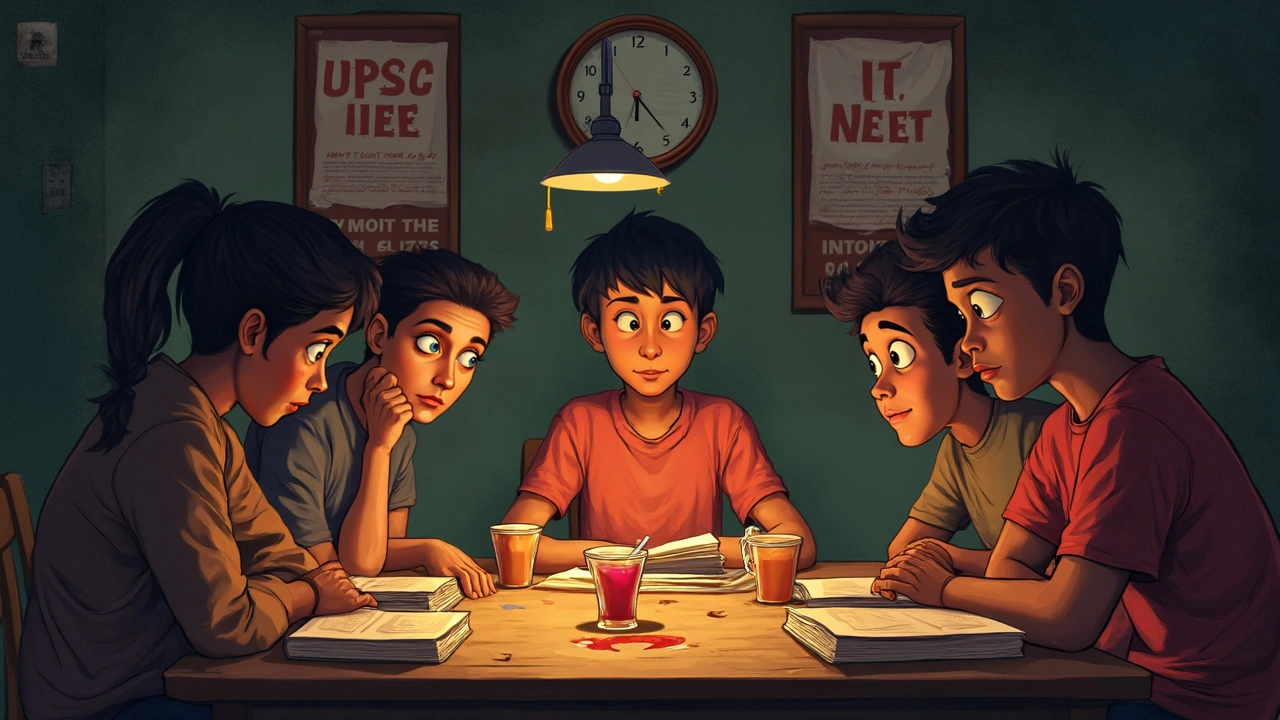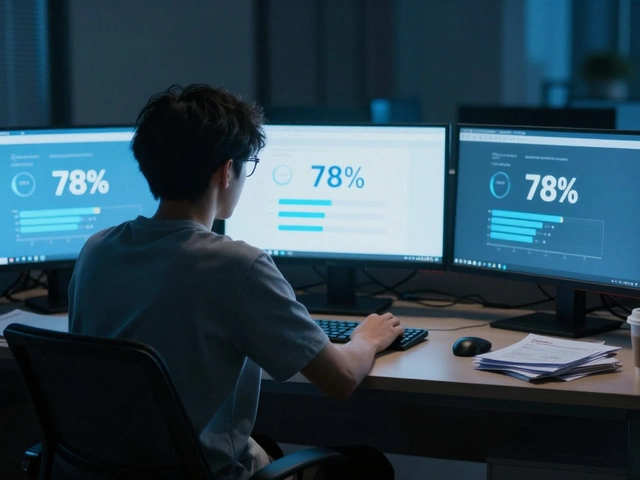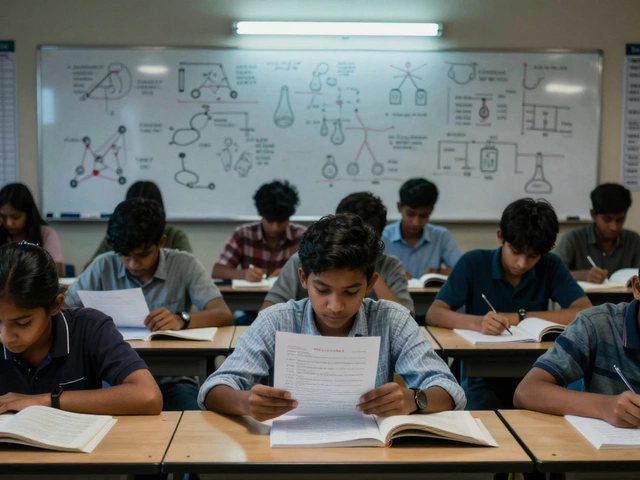Some exams chew people up and spit them out, no matter how hard they prepare. If you've ever wondered why people fear certain tests, you're not alone. What really makes an exam hard? Is it the insane amount of stuff to memorize, tiny pass rates, or just brutal time limits?
Think about the UPSC in India, the CFA exams for finance, or the Gaokao in China. These aren’t just tests—they’re almost like marathons, obstacle courses, and mental chess matches all rolled into one. It’s not just about knowing the material; you have to handle stress, keep your focus, and sometimes even push through hundreds of pages in a single sitting.
Planning to take one of these monster exams? The way you study, the habits you build, and even how you manage your sleep can make a bigger difference than you’d think. Stick around; there’s a lot to unpack if you want to beat the odds.
- What Makes an Exam 'Hard'?
- Famous Exams That Push People to Their Limits
- Surprising Stats and Stories
- Real-Life Preparation Tips
- Should the 'Hardest' Even Matter?
What Makes an Exam 'Hard'?
If you ask anyone why some competitive exams feel impossible, you’ll usually get a list of complaints: the mountain of stuff to study, questions that come out of nowhere, and rules so strict one small mistake can blow your entire shot. But when you dig in, there’s a little more to it than just tough questions.
First, look at the sheer volume of information. Some of the world’s hardest exams require months (sometimes even years) of study. Take the Indian UPSC Civil Services Exam—candidates have to cover everything from history and politics to science, with current events always thrown into the mix. The CFA exam for finance? It’s famous for 300+ hours of recommended study time per level. Insane, right?
Then, there’s the wickedly low pass rates. If you’re chasing a spot at the top, odds are not in your favor. Check out these numbers:
| Exam | Pass Rate (%) |
|---|---|
| UPSC (India) | 0.2 |
| CFA Level 1 | 41 |
| Gaokao (Top universities) | <2 |
| California Bar Exam (2023) | 44 |
But content and pass rates aren’t the only things people trip over. Many hardest exams have high-pressure time constraints—think of medical entrance tests where you need to answer a question every 45 seconds or multi-day qualifying papers, like the Japanese National Bar Exam (about six days!). Some tests even add trick questions on purpose, just to mess with your head.
And don’t forget how much pressure plays a role. Most competitive exams are high-stakes. Your career, your future, your self-esteem—they all feel like they’re on the line. For a lot of people, that stress can freeze them up or make them second-guess even the stuff they know well.
So, what does all this mean for you? The “hardest exam” is usually the one that overwhelms you the most—because of what’s at stake, how hard it is to qualify, and how seriously it tests your stamina and strategy, not just your knowledge.
Famous Exams That Push People to Their Limits
If you talk about hardest exams, three names pop up again and again: India’s UPSC, China’s Gaokao, and the CFA exams for finance pros worldwide. Each one has its own brand of pain, making them the stuff of legends—and a few nightmares.
UPSC Civil Services Exam (India): This monster attracts more than a million hopefuls every year. Out of those, only about 0.2% actually get the job they want. The prep cycle drags on for years, with three different stages—Prelims, Mains, and the Interview. Topics range from history and economics to arcane government procedures. It’s so tough, candidates sometimes spend their 20s just prepping for this one shot.
Gaokao (China): The Gaokao is a national obsession in China, kind of like college entrance exams everywhere else—but way more serious. This two-day exam covers everything from literature to math to science. No surprise, students clock crazy study hours, often sacrificing sleep and weekends. It’s not just about getting into university—it actually shapes your whole career and even marriage prospects in some places. Fun fact: some villages advertise their kids’ Gaokao scores on banners like sports stats.
| Exam | Typical Candidates (yearly) | Estimated Pass Rate |
|---|---|---|
| UPSC (India) | 1,000,000+ | ~0.2% |
| Gaokao (China) | 10,000,000+ | Varies by university, <5% for top schools |
| CFA Level I | 200,000+ | ~40% |
CFA Exam (Global): Future finance gurus dread the Chartered Financial Analyst exam. Three separate levels, each one trickier than the last, all with heaps of math, ethics, and analysis. The kicker? You need about 300 hours of study for each level, and you can’t call yourself a CFA until you pass all three—no half-measures here. That’s why less than 20% actually make it from start to finish without failing a level.
Some other exams also come up in conversations about difficult competitive exams—like the USMLE for future doctors in the US and South Korea’s Suneung. But UPSC, Gaokao, and CFA are often the poster children for just brutal difficulty and life-changing stakes.

Surprising Stats and Stories
Ready for some jaw-dropping numbers? Some competitive exams aren’t just tough—they’re almost legendary for how many people walk out disappointed. Take a look at these real stats and stories that put the "hardest exam" debate into perspective.
Let’s start with India’s UPSC Civil Services Exam. Each year, around 1 million people sign up for this legendary test, but only about 1,000 land a job. That’s a 0.1% success rate—basically, you’ve got a better chance of getting struck by lightning than cracking this test on your first try.
China’s Gaokao is another monster. High school students pour years into preparing, knowing their whole future rides on just a couple of nail-biting days. Out of nearly 13 million Gaokao takers in 2024, only about 2% scored high enough to qualify for the country’s top universities. The pressure is so intense, some families actually rent hotel rooms next to test centers just to avoid traffic and nerves on exam day.
Finance folks sweat bullets over the CFA exams. The Level I pass rate was just 37% in December 2024. And here’s the thing: this exam goes up to Level III, and only about 10% of people who start actually make it through all three rounds. That’s a grind few can even fathom.
| Exam Name | 2024 Pass Rate | Number of Takers |
|---|---|---|
| UPSC (India) | 0.1% | 1,000,000 |
| Gaokao (China) | 2% | 13,000,000 |
| CFA Level I | 37% | 200,000+ |
| USMLE Step 1 (USA) | about 94% (for US grads) | some 20,000 |
Even the SAT or the Bar Exam in the US look mellow in comparison. For example, USMLE Step 1 (the make-or-break medical test for future American doctors) has a much higher pass rate, but the anxiety and years of effort leading up to it make even successful docs sweat just thinking about that day.
Some people have taken the UPSC exam more than a half dozen times before passing. For others, repeating the Gaokao for several years is almost a family tradition. These stories aren’t about a single bad day—they’re about amazing persistence and a system built to create impossible odds. These are the numbers and stories that show why people never forget their hardest test.
Real-Life Preparation Tips
You can’t wing it with competitive exams like the CFA, UPSC, or Gaokao. These aren’t your average school tests—they chew up crammers and spit them out. So, how do people actually pass?
- Set a Realistic Daily Study Schedule: No one memorizes thousands of pages in a day. People who pass the hardest exams break it into manageable chunks. If you look at UPSC toppers, many stick to 6-8 hour blocks, mixing subjects to keep boredom away. The CFA Institute even suggests candidates need over 300 hours per level—spread it out instead of panic-studying.
- Master Past Papers and Mock Tests: Top scorers almost always go heavy on past papers. Mock tests mimic the pressure and weird surprises of the real thing. For NEET in India, past paper questions get repeated or reworded, so practicing them can make a direct difference. Same goes for the bar exam in the USA—practicing multiple-choice MBEs is key.
- Get Real With Revision: Revise better, not just more. Use spaced repetition—review tricky topics again and again, but put some time between sessions. Apps like Anki or even plain flashcards can force your brain to remember, not just reread mindlessly.
- Don't Sacrifice Sleep and Health: Pulling all-nighters messes up memory and mood. A Harvard Medical School study found that students who got seven to eight hours of sleep performed consistently better on hard exams.
- Join a Study Group (But Avoid Time-Wasters): Study groups work best when you actually practice problems together—if it’s just complaining about the hardest exam ever, skip it.
Check out how much time people usually spend prepping for the world’s toughest tests:
| Exam | Average Prep Time |
|---|---|
| CFA Level 1 | 300+ hours |
| UPSC Civil Services | 1-2 years |
| US Bar Exam | 400-600 hours |
| Gaokao (China) | 2-3 years intense prep |
If you’re facing a hardest exam, remember—it’s not about being some superhuman genius. Nail your plan, keep your wellbeing in check, and treat every mock test like the real deal. Those small, steady wins add up faster than any late-night cram session.

Should the 'Hardest' Even Matter?
Everyone loves to argue about which is the hardest exam. But does it even matter if you’re aiming for the toughest test, or should you just focus on the one that gets you where you want to go? Chasing the title of “most difficult” can actually be a distraction. What’s tough for one person might feel totally doable for someone else—it all depends on your strengths and your goals.
Here’s something real: the Gaokao (China’s college entrance exam) has around 10 million test-takers every year, but only the top 2% get into the best universities. The CFA Level 1 exam, loved and feared by finance fans, usually sees less than 40% pass on the first try. But just because these tests have low pass rates doesn’t mean they’re the right fit—or even matter—to everyone. For example, the UPSC (India’s civil service exam), considered one of the most brutal, is mainly for those who want to work in government. If your future is in tech, medicine, or law, what’s the point of stressing about UPSC?
Here’s a quick data snapshot of some famous competitive exams and their typical pass rates:
| Exam | Country | Typical Pass Rate |
|---|---|---|
| UPSC | India | ~0.2% |
| Gaokao | China | ~2% (top universities) |
| CFA Level 1 | Global | ~36% |
| USMLE Step 1 | USA | ~97% for U.S. med grads |
Chasing the “hardest” just for bragging rights doesn’t get you a job, a degree, or a better future. It’s way more smart to match your ambitions to the right exam. Some people ace the SAT but freeze during oral exams. Others are fine with essays but dread math. Finding the competitive exam that lines up with your dream career and your strengths is what really counts.
- Pick the exam that leads to the life you want, not just the one with the scariest stats.
- Focus on what you can control: study smart, manage your time, and practice under real exam conditions.
- Remember, the best exam for you is the one that actually matters for your future—not just the hardest one you can find.





